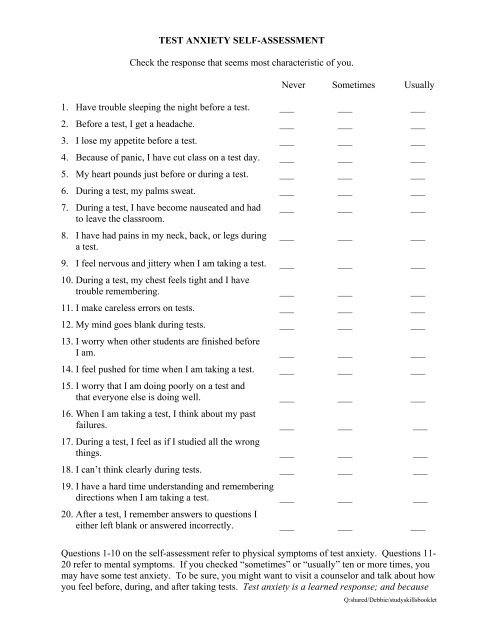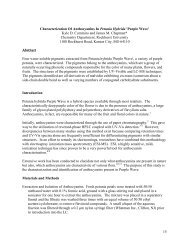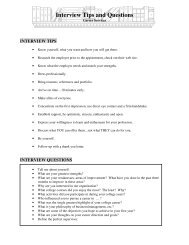NHTI Learning Center Test Anxiety Self-Assessment
NHTI Learning Center Test Anxiety Self-Assessment
NHTI Learning Center Test Anxiety Self-Assessment
Create successful ePaper yourself
Turn your PDF publications into a flip-book with our unique Google optimized e-Paper software.
TEST ANXIETY SELF-ASSESSMENTCheck the response that seems most characteristic of you.Never Sometimes Usually1. Have trouble sleeping the night before a test. ___ ___ ___2. Before a test, I get a headache. ___ ___ ___3. I lose my appetite before a test. ___ ___ ___4. Because of panic, I have cut class on a test day. ___ ___ ___5. My heart pounds just before or during a test. ___ ___ ___6. During a test, my palms sweat. ___ ___ ___7. During a test, I have become nauseated and had ___ ___ ___to leave the classroom.8. I have had pains in my neck, back, or legs during ___ ___ ___a test.9. I feel nervous and jittery when I am taking a test. ___ ___ ___10. During a test, my chest feels tight and I havetrouble remembering. ___ ___ ___11. I make careless errors on tests. ___ ___ ___12. My mind goes blank during tests. ___ ___ ___13. I worry when other students are finished beforeI am. ___ ___ ___14. I feel pushed for time when I am taking a test. ___ ___ ___15. I worry that I am doing poorly on a test andthat everyone else is doing well. ___ ___ ___16. When I am taking a test, I think about my pastfailures. ___ ___ ___17. During a test, I feel as if I studied all the wrongthings. ___ ___ ___18. I can‘t think clearly during tests. ___ ___ ___19. I have a hard time understanding and rememberingdirections when I am taking a test. ___ ___ ___20. After a test, I remember answers to questions Ieither left blank or answered incorrectly. ___ ___ ___Questions 1-10 on the self-assessment refer to physical symptoms of test anxiety. Questions 11-20 refer to mental symptoms. If you checked —sometimes“ or —usually“ ten or more times, youmay have some test anxiety. To be sure, you might want to visit a counselor and talk about howyou feel before, during, and after taking tests. <strong>Test</strong> anxiety is a learned response; and becauseQ:shared/Debbie/studyskillsbooklet
you learned it, you can unlearn it. This lesson will give you a better understanding of testanxiety and identify coping strategies to reduce it.WHAT CAUSES YOUR TEST ANXIETY?If you are like most test-anxious students, your anxiety results from several common causes:1. Being afraid that you won‘t live up to the expectations of important people in your life;worrying that you will lose the affection of people you care about if you don‘t succeed;2. Believing grades are an estimation of your personal worth;3. Placing too much emphasis on a single test;4. Giving in to guilt feelings or anxiety as a result of inadequate preparation for tests;5. Feeling helpless, believing that you have no control over your performance or grades.Expectations. Many students‘ perceptions of what their parents or important others expect areinaccurate. If you worry that you will alienate people you care about unless you do well incollege, you may become fearful and anxious that you will disappoint them or make them angry.If you believe that you can‘t live up to the expectations of others, tests may make you especiallyanxious.Grades and <strong>Self</strong>-Esteem. A grade of D, F, or even C for some students translates into —I‘mstupid“ or —I‘m not college material.“ These feelings may lead to a loss of self-esteem and moreanxiety. Students who equate test grades with self-worth are assigning more importance togrades than they deserve. One real value of testing is that it gives you an opportunity to find outwhat information you understand well enough to associate with material that you will learnlater. Before your next exam, you can give this material a quick review. Mistakes on a testpinpoint areas that you need to study more thoroughly for the next exam.Feelings of Helplessness. If you have an external locus of control, you may not see theconnection between study and grades. You may become anxious because you cannot predict theoutcome of a test. Even if your locus of control is internal, you may feel temporarily helpless ina testing situation when you know you have not studied enough. Feeling guilty for not meetingyour responsibilities may cause you to experience test anxiety.Once you have identified the cause of your test anxiety, you can take steps eliminate it. Thechart on the following page shows you how to start.Q:shared/Debbie/studyskillsbooklet
<strong>Test</strong> <strong>Anxiety</strong>: Causes and Eliminators CausesEliminators1. Trying to meet other people‘sexpectationsDecide whether living up to these expectations issomething you want to do for yourself. Set your owngoals and live up to your own expectations.2. Fearing loss of affection Understand that people like you and value your presencein their lives for many reasons, none of which is the gradeyou made on a test.3. Letting grades determine your self-worth Realize that a grade is only an approximate measure ofyour performance. Grades have nothing to do with you asa person but are a helpful guide to what you need toreview.4. Placing excessive emphasis on a singletest5. Giving in to guilt or anxiety due to lack ofpreparationYour semester grade may include, in addition to tests,quizzes, homework, papers, presentations, lab reports, andclass participation. Keep up with the material as if youmust take a major test every week to demonstrate whatyou are learning and how to apply information.College requires a commitment of time and money. Ifyou are truly well prepared, you will —forgive“ yourselffor a few mistakes due to stress or anxiety. If you do feelguilty, it may be because you have not really done yourbest to make school a priority and focus in your life.6. Underpreparing and —going blank“ The purpose of tests and exams is: (1) to evaluate yourretention of course material and (2) to apply theinformation to demonstrate understanding or to solve newproblems. Failing to properly prepare and doing poorlyon the exam becomes a self-perpetuating cycle of loweffort leading to low grades.7. Feeling helpless, with no control overwhat happensTake charge by developing an internal locus of control.Improve your study habits. Prepare for your next test,starting NOW. Observe the connection between theamount and quality of your studying and the grade youearn.Q:shared/Debbie/studyskillsbooklet
Q:shared/Debbie/studyskillsbooklet
















